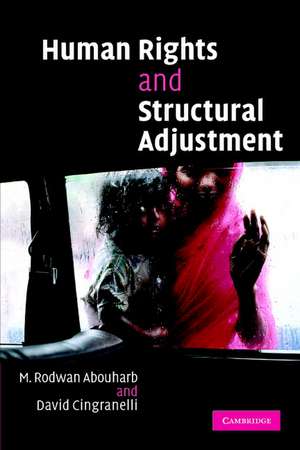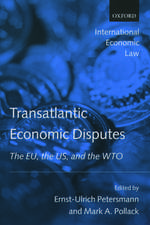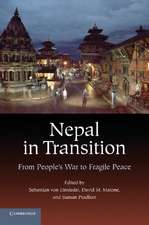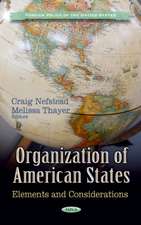Human Rights and Structural Adjustment
Autor M. Rodwan Abouharb, David Cingranellien Limba Engleză Paperback – 12 dec 2007
| Toate formatele și edițiile | Preț | Express |
|---|---|---|
| Paperback (1) | 286.89 lei 6-8 săpt. | |
| Cambridge University Press – 12 dec 2007 | 286.89 lei 6-8 săpt. | |
| Hardback (1) | 721.53 lei 6-8 săpt. | |
| Cambridge University Press – 12 dec 2007 | 721.53 lei 6-8 săpt. |
Preț: 286.89 lei
Nou
Puncte Express: 430
Preț estimativ în valută:
54.91€ • 59.67$ • 46.16£
54.91€ • 59.67$ • 46.16£
Carte tipărită la comandă
Livrare economică 21 aprilie-05 mai
Preluare comenzi: 021 569.72.76
Specificații
ISBN-13: 9780521676717
ISBN-10: 0521676711
Pagini: 292
Ilustrații: 2 b/w illus. 20 tables
Dimensiuni: 153 x 227 x 17 mm
Greutate: 0.43 kg
Ediția:New.
Editura: Cambridge University Press
Colecția Cambridge University Press
Locul publicării:Cambridge, United Kingdom
ISBN-10: 0521676711
Pagini: 292
Ilustrații: 2 b/w illus. 20 tables
Dimensiuni: 153 x 227 x 17 mm
Greutate: 0.43 kg
Ediția:New.
Editura: Cambridge University Press
Colecția Cambridge University Press
Locul publicării:Cambridge, United Kingdom
Cuprins
Part I. The Argument: 1. Structural adjustment programs undermine human rights; 2. Respect for human rights promotes development; 3. Theory; Part II. Estimating the Human Rights Effects of Structural Adjustment: 4. Hypotheses and methods; 5. Selection; Part III. Findings: 6. Economic and social rights; 7. Civil conflict; 8. Torture, murder, disappearance and political imprisonment; 9. Worker rights; 10. Democracy; Part IV. Conclusion: 11. A rights-based approach to development.
Recenzii
'Neoliberal economic policies and their imposition on developing countries by the IMF and the World Bank under the name of structural adjustment policies (SAPs) have long been targets of criticism by human rights advocates. Human Rights and Structural Adjustment not only brings together the rich theoretical arguments and empirical evidence but also provides comprehensive comparative analyses of the impact of SAPs on a variety of human rights. It speaks to all who are interested in human rights, democracy, development, poverty and political economy. As a corrective, it should be distributed to the executives of the two agencies and the US Treasury Department as a must reading.' Zehra F. Kabasakal Arat, Purchase College, State University of New York
'This book addresses a significant policy issue at a time when there is a growing consensus on the importance of human rights based approaches to development. The analysis shows that World Bank and IMF structural adjustment programmes have actually had adverse effects on a range of human rights practices in aid recipient states; effects which may well undermine the attempt to establish the social and political institutions necessary for good governance. Scholars and practitioners in the fields of development, democracy and human rights should take heed of the robust findings presented in this book and use its important lessons for the future.' Todd Landman, University of Essex
'This is by far the most illuminating and comprehensive research on the effects of structural adjustment on human rights conducted to date. Abouharb and Cingranelli's study goes well beyond past research that has focused on a rather narrow set of human rights related to physical integrity, to examine the effects of these programs on the realization of a variety of rights including social and economic rights, the rights of workers, and potential intervening factors such as rebellion. Their two-stage modeling strategy accounts for "selection effects" which could easily lead to erroneous findings if the less sophisticated, one stage approach used in previous research had been employed. Most importantly, this study demonstrates how careful quantitative and qualitative analysis can shed light on the answers to hotly contested policy questions that often tend to be argued, and decided, from ideological positions. In the final analysis, this book's most important contribution is its sound, empirically-supported findings which illuminate the variables and processes that result in human suffering around the world. By providing this glimpse of political reality to participants in the political debate on structural adjustment, Abouharb and Cingranelli could very well play a part in improving the human problems that have been their greatest scholarly concern.' Steven C. Poe, University of North Texas
'This study is the most comprehensive work on the impacts of how World Bank and IMF conditional lending have impacted human rights. Filled with many examples as well as careful analysis of a wealth of data, the book convincingly shows not only that the Bretton Woods Institutions have failed to promote human rights, but also that their structural adjustment programs have actually hurt human development. The book - the first of its kind - will spark a new generation of study of the World Bank and the IMF. It is a must read for anyone interested in human rights, international institutions or globalization.' James Raymond Vreeland, Yale University
'… comprehensive, well-presented, carefully researched … this book has set the standard on the issue of SAPS and human rights. It should be required reading for graduate students and read cover-to-cover.' The Review of International Organisations
'… one of the most important works on the critical policy juncture of human rights and development … the book's considerable insights … thorough attention to the basics, and its approachable language and style, make it highly accessible to a wide audience.' International Studies Review
'… political scientists, economists, and other empirical researchers will relish analyzing, re-estimating, dissecting, and extending this seminal contribution from Abouharb and Cingranelli for years to come.' Human Rights and Human Welfare
'This book addresses a significant policy issue at a time when there is a growing consensus on the importance of human rights based approaches to development. The analysis shows that World Bank and IMF structural adjustment programmes have actually had adverse effects on a range of human rights practices in aid recipient states; effects which may well undermine the attempt to establish the social and political institutions necessary for good governance. Scholars and practitioners in the fields of development, democracy and human rights should take heed of the robust findings presented in this book and use its important lessons for the future.' Todd Landman, University of Essex
'This is by far the most illuminating and comprehensive research on the effects of structural adjustment on human rights conducted to date. Abouharb and Cingranelli's study goes well beyond past research that has focused on a rather narrow set of human rights related to physical integrity, to examine the effects of these programs on the realization of a variety of rights including social and economic rights, the rights of workers, and potential intervening factors such as rebellion. Their two-stage modeling strategy accounts for "selection effects" which could easily lead to erroneous findings if the less sophisticated, one stage approach used in previous research had been employed. Most importantly, this study demonstrates how careful quantitative and qualitative analysis can shed light on the answers to hotly contested policy questions that often tend to be argued, and decided, from ideological positions. In the final analysis, this book's most important contribution is its sound, empirically-supported findings which illuminate the variables and processes that result in human suffering around the world. By providing this glimpse of political reality to participants in the political debate on structural adjustment, Abouharb and Cingranelli could very well play a part in improving the human problems that have been their greatest scholarly concern.' Steven C. Poe, University of North Texas
'This study is the most comprehensive work on the impacts of how World Bank and IMF conditional lending have impacted human rights. Filled with many examples as well as careful analysis of a wealth of data, the book convincingly shows not only that the Bretton Woods Institutions have failed to promote human rights, but also that their structural adjustment programs have actually hurt human development. The book - the first of its kind - will spark a new generation of study of the World Bank and the IMF. It is a must read for anyone interested in human rights, international institutions or globalization.' James Raymond Vreeland, Yale University
'… comprehensive, well-presented, carefully researched … this book has set the standard on the issue of SAPS and human rights. It should be required reading for graduate students and read cover-to-cover.' The Review of International Organisations
'… one of the most important works on the critical policy juncture of human rights and development … the book's considerable insights … thorough attention to the basics, and its approachable language and style, make it highly accessible to a wide audience.' International Studies Review
'… political scientists, economists, and other empirical researchers will relish analyzing, re-estimating, dissecting, and extending this seminal contribution from Abouharb and Cingranelli for years to come.' Human Rights and Human Welfare
Notă biografică
Descriere
Critique of the effect of World Bank and IMF structural adjustment agreements on developing countries.
















